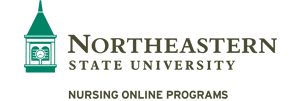Year after year, registered nurses (RNs) take the top spot in Gallup’s poll on professional honesty and ethics. Effective communication is key to building the trusted nurse-patient relationships that define the nursing profession. The result is a higher quality of care and patient satisfaction.
Earning a Bachelor of Science in Nursing (BSN) can help RNs develop the communication skills employers want to see. Northeastern State University (NSU) offers an online RN to BSN program that builds on previous education and experience to prepare nurses to meet the standards for professional performance, including communication.
Types of Communication
Words are one way to communicate. But tone and non-verbal communication — like an eye roll, for example — speak volumes too. People often communicate in more than one way at any given time.
Following is a look at three basic types of communication:
- Verbal communication: The use of words and sounds to convey a message may take place face to face, over the phone or via other digital communication technologies.
- Written communication: Emails, memos, texts and notes are common forms of written communication. Written communications can be easily misinterpreted, in part because they lack visual cues. Using clear language can help avoid misunderstandings from people reading between the lines.
- Non-verbal communication: Non-verbal communication includes gestures, facial expressions, posture and body orientation, tone, and pitch. While direct eye contact can foster trust, it is considered rude in some cultures, so it helps to develop cultural sensitivity as a nurse.
Why Is Effective Communication in Nursing so Important?
As patient advocates, RNs are an essential voice on multidisciplinary teams, where patient safety depends on effective communication.
Shifts begin and end with hand-offs that include critical communication. In between, there may be very few moments that do not involve some type of communication. Following are 10 of the many ways that sharpening communication skills benefits patients and nurses:
- Establishing patient rapport: Building rapport requires communication that is both informative and caring. With new patients, just asking what they would like to be called shows respect.
- Improving transition of care: According to The Joint Commission, gaps in communication are a leading cause of adverse events in patient handoffs. “Inadequate hand-off communication” leads to 30% of all malpractice claims. RNs can take the lead in improving hand-off communication to protect patient safety.
- Enhancing patient education: Educating patients is a vital nursing role. According to Nurse Journal, more than 50% of the population has low “health literacy.” Health literacy relates to an individual’s ability to understand basic health information and services to make the right health decisions.
- Increasing discharge instruction compliance: Related to #3, clear discharge instructions can make the difference between patients who can manage their care and costly readmissions. Communicating discharge information in a way that meets patient needs helps ensure compliance. Pictures, diagrams and video-discharge instructions, for example, can help address language barriers.
- Providing culturally competent care: Diversity factors into all patient interactions. Providing culturally competent care requires communicating with an understanding of social, cultural and language norms. Culturally competent communication strengthens the nurse-patient relationship and reduces disparities in healthcare.
- Creating a healthy work environment: Nursing can be highly stressful, leading to conflict with co-workers and other healthcare professionals, and sometimes even patients. Naturally, communication skills are a must for dealing effectively with conflict and keeping the focus on patient care. The payoff? Improved patient care, higher morale and greater job satisfaction.
- Embracing health information technology: Electronic health records (EHRs) can promote patient-centered communication. For example, EHRs can reduce the time it takes to access patient history, leaving more time for the patient. Inviting patients to view their EHR during a visit can encourage active participation in their care. It is important to use sensitivity in wording notes.
- Improving documentation: Documentation is a requirement of nursing practice. Keeping up with EHR technology can enhance documentation as a communication tool. As the American Nurses Association explains, timely documentation should be made to “support the ability of the health care team to ensure informed decisions and high quality care in the continuity of patient care.”
- Improving nurse-physician relationships: Nurses and physicians work alongside one another, with the same goals for quality of care. Yet inter-professional conflict happens. Professional communication skills make it easier to speak up when patient safety may be compromised.
- Preparing for leadership roles: Communication is an essential competency for nurse leaders. Aspiring nurse leaders can find opportunities every day to improve communication in their unit.
RNs face challenges in the workplace every day. Whether to address and resolve conflicts with colleagues or to prevent medical error in transitions of patient care, effective communication skills are critical to professional nursing practice.
Research backs up the benefits of a BSN education. In today’s complex healthcare environments, patient outcomes may depend on an RN’s ability to communicate effectively. As a bonus, developing effective communications skills can give RNs an edge in landing a great job.
Learn more about Northeastern State University’s online RN to BSN program.
Sources:
Gallup: Nurses Again Outpace Other Professions for Honesty, Ethics
American Nurses Association: Competency Model
The Joint Commission: Inadequate Hand-Off Communication
Nurse Journal: Tips to Improve Patient Education
American Nurses Association: Principles for Nursing Documentation
American Association of Colleges of Nursing: The Impact of Education on Nursing Practice


